Best burgundy flowers and plants – 5 statement choices and how to care for them
From velvety blooms to fabulous foliage, these burgundy plants will add on-trend drama to your outdoor space
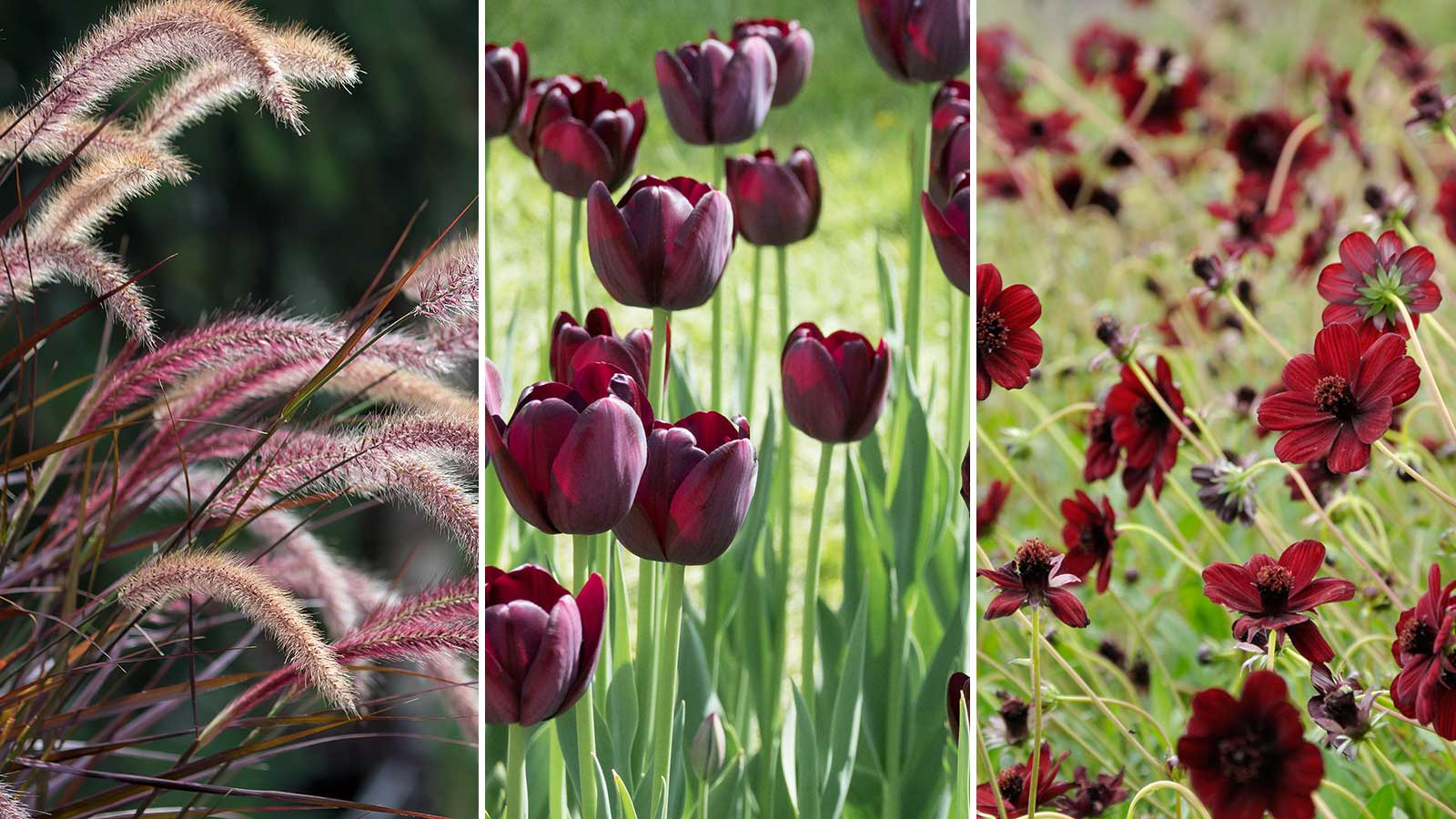

While I love pretty pastels, darker plants in burgundy tones have always intrigued me. They channel a glamorous, gothic appeal that feels slightly different from the norm. Plus, they create a real statement when cut and brought indoors.
Whether you want to add contrast and depth to a garden color scheme, are planning a new container display, or fancy introducing some new cutting garden flowers to your plot, burgundy picks will provide plenty of drama. There are, perhaps surprisingly, lots of options to choose from.
It isn't just flowers that showcase this sumptuous hue – there are trees and even ornamental grasses that suit this palette, too. Below, you'll find five fabulous varieties, alongside expert insights and practical care tips.
5 brilliant burgundy options for borders or pots
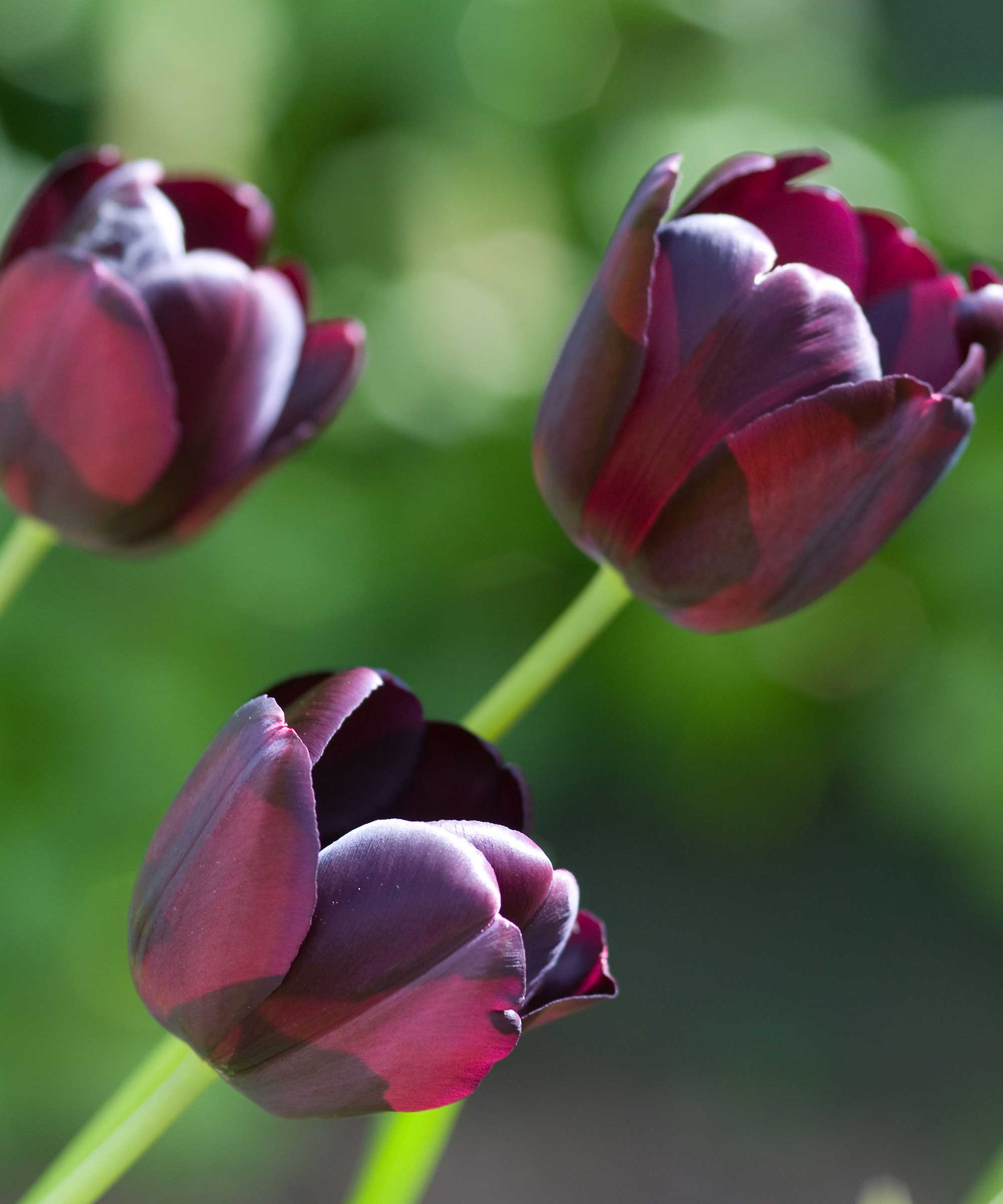
'Queen of Night' tulips offer rich color in spring
Embrace the dark side by adding this sultry, on-trend shade to your yard – it works particularly well alongside contrasting cream or white flowers.
1. Chocolate Cosmos
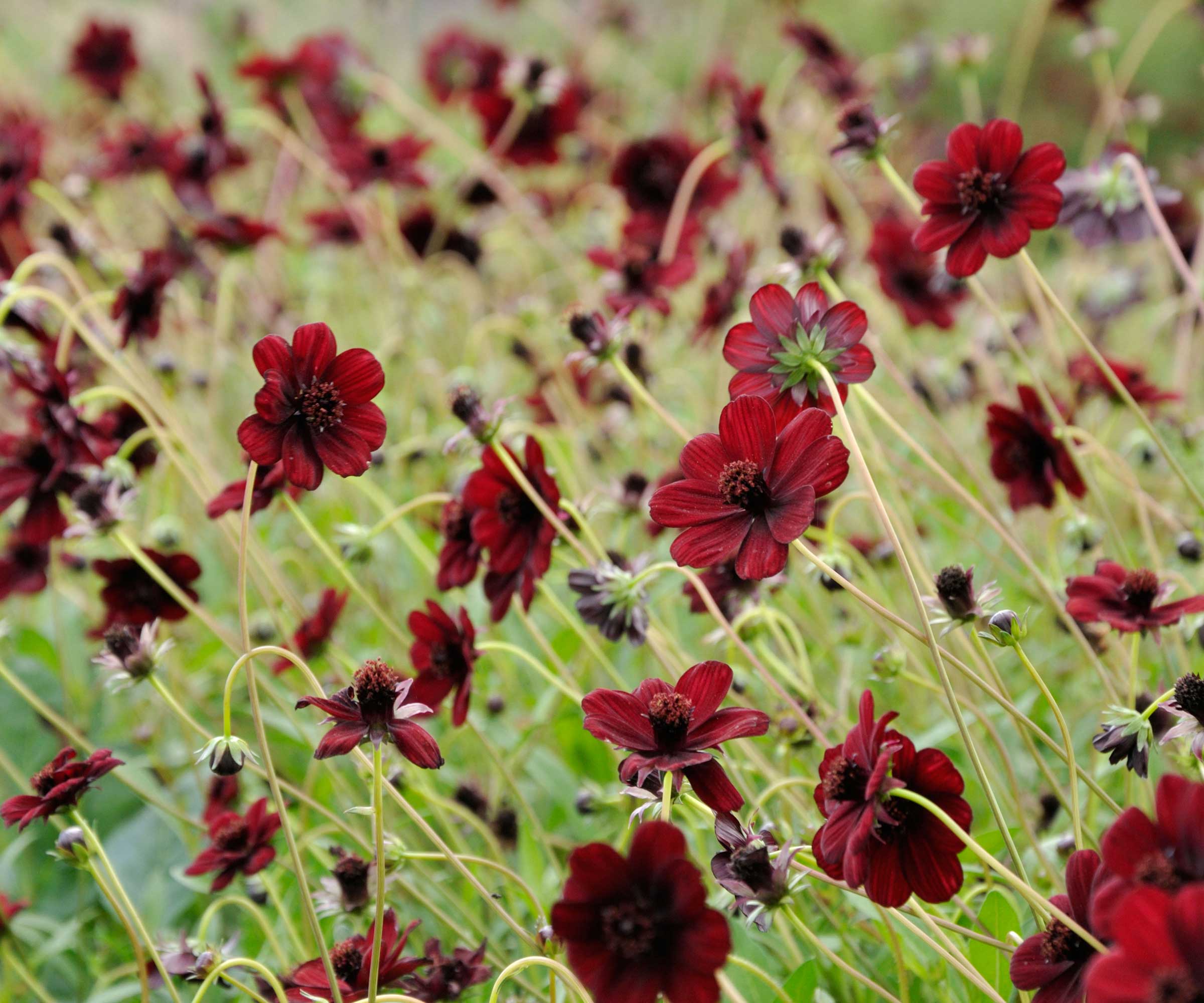
These sun-loving plants are perennial in warmer climates
Chocolate cosmos (Cosmos atrosanguineus) make a gorgeous addition to a cutting garden. 'These are shorter than other cut flower cosmos, but at 30 inches, still give you plenty of stem length,' says Nicole Dillon, the owner of Breemar Flower Farm. 'I’d pair chocolate cosmos with marigolds for a beautiful fall arrangement.'
While annual cosmos are one of the easiest flowers to grow from seed, chocolate cosmos are usually grown from tubers and will come back year after year in the right climate. 'They are a tender perennial for zones 9-11,' says Nicole. 'You may have success overwintering them with heavy mulching in zones 7-8.' Alternatively, you can lift and store the tubers in the fall, similar to overwintering dahlias.
Meredith Bishop, a cut-flower grower of Bloom & Bounty, highlights their unique vanilla-chocolate scent. They're also irresistible to pollinators, such as bees and butterflies, she adds.
You can shop for Cosmos atrosanguineus 'Choca Mocha' plants from Burpee – a slightly smaller variety that grows to around 12 inches.
Top tip: Like annual cosmos, plant chocolate cosmos where they'll get plenty of sunshine.

Nicole Dillon is a micro-flower farmer and owner of Breemar Flower Farm based in Ashland, VA. With a profound love for gardening, Nicole has transformed a passion for nurturing plants into a thriving business. Specializing in growing peonies and cut flowers, Nicole shares her expertise through a weekly blog aimed at home gardeners. Her mission is to inspire and educate gardeners of all levels, helping them create beautiful, sustainable spaces. Nicole also volunteers as a master gardener in her hometown.

Meredith Bishop is an heirloom cut-flower grower in urban Nashville, TN. She operates a design studio called Bloom & Bounty with her organically-grown flowers, and enjoys writing, speaking, and leading all manner of gardening workshops.
2. 'Bloodgood' Japanese Maple
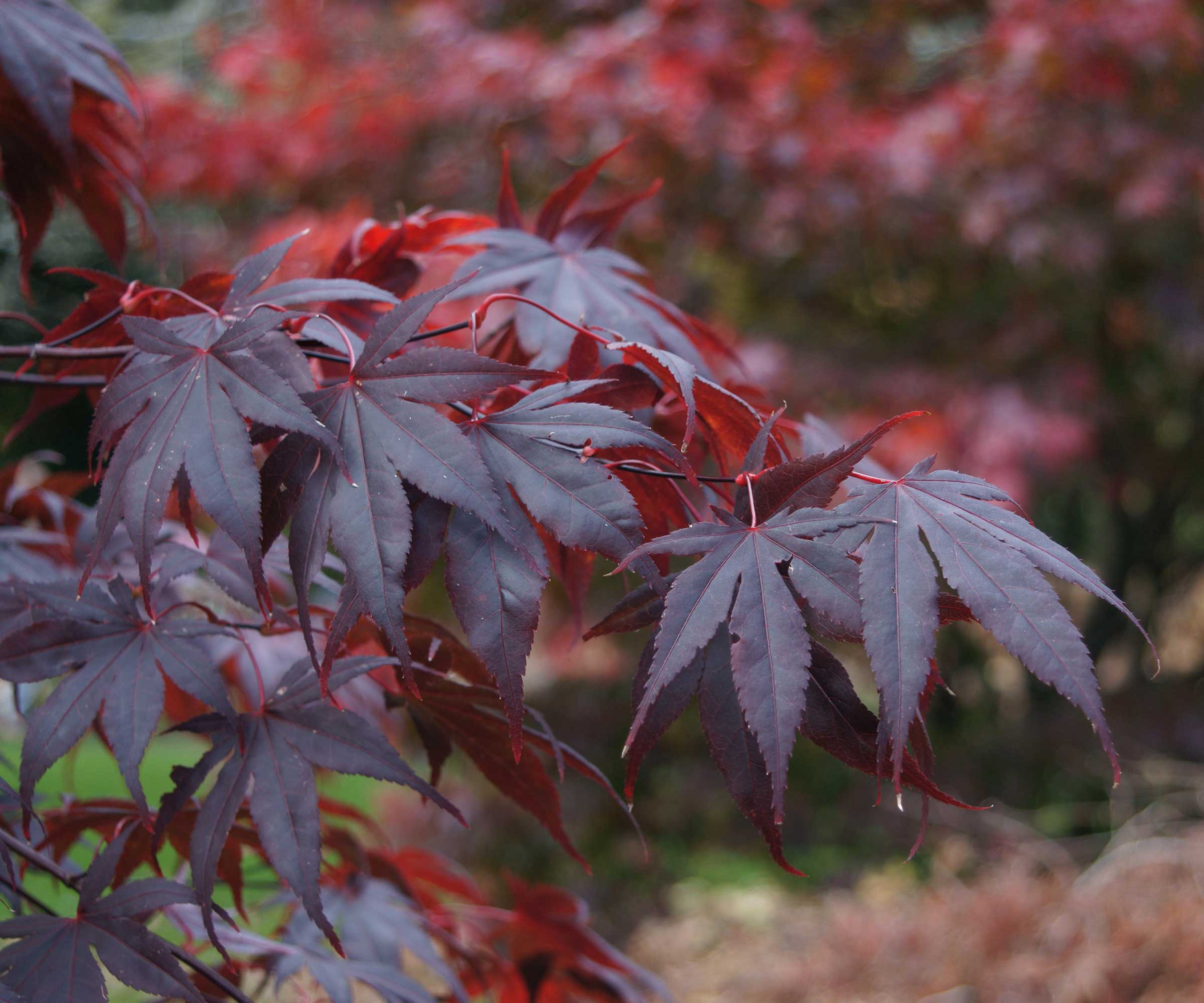
Acers are some of the best ornamental trees for vivid color
'"Bloodgood" Japanese maple is a showstopper, with beautiful burgundy foliage that turns a brilliant scarlet in the fall,' says Megan McConnell of Monrovia. What's more, it has unique red-black bark, she adds, which brings 'lovely interest to yards even in the winter after the leaves have fallen.'
Suitable for hardiness zones 5-8, this acer can grow up to 15ft tall, making a striking focal point that's perfect for Japanese-inspired gardens. However, you can also grow it in a container and prune it when needed to restrict its size.
Plant it in a sheltered, partially shaded site to protect its vibrant leaves from scorching in the sun.

In addition to managing Monrovia’s plant database of nearly 4,000 different varieties, Megan is responsible for all the plant information that appears on Monrovia.com and the tags you see on plants in the garden center. Megan has a bachelor's in horticulture from Oregon State University with an emphasis on ecological landscapes and urban forestry, as well as certifications in organic gardening, permaculture, and sustainable landscaping. Before joining Monrovia, she worked as a professional landscape designer.
3. 'Queen of Night' tulip
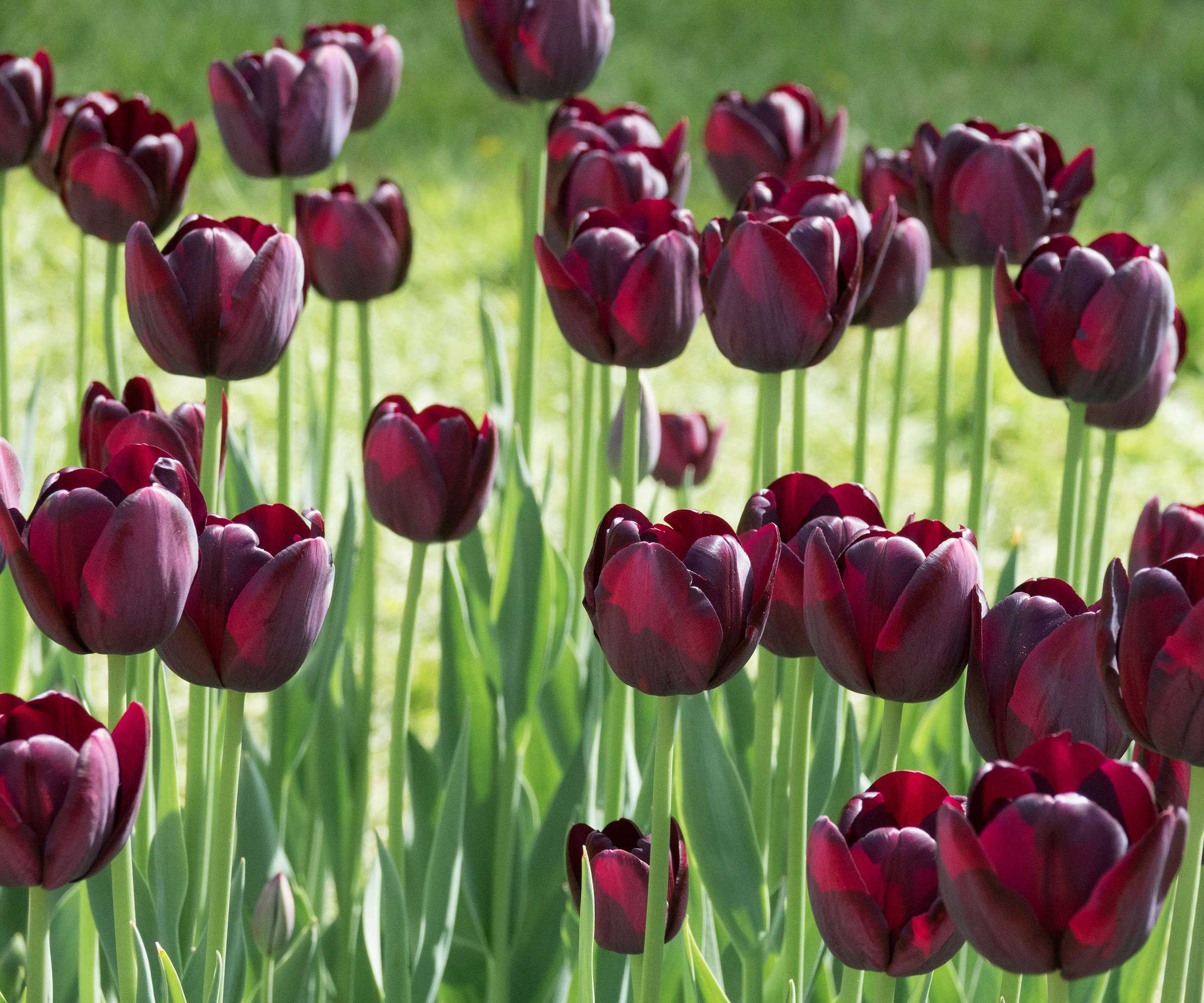
Plant tulips somewhere with well-draining soil
'Queen of Night' tulips, available from Nature Hills, are easily one of the best burgundy flowers for spring.
Meredith says, 'The deep maroon, cup-shaped bloom grows atop a long, strong stem which is perfect for cutting or leaving as a tall back border in a spring garden.
'These dramatic, nearly-black tulips are a perfect sultry companion to the apricot, peach, pink and lemon shades of spring,' Meredith adds. Alternatively, Nicole suggests planting these single late bloomers in a black and white garden, or pairing them with bright jewel tones.
Plant tulips in the fall, in a spot with very good drainage, just like any other spring bulb. They're a stunning option for spring planters – why not try incorporating them into a bulb lasagna for successional color?
4. Purple Fountain Grass
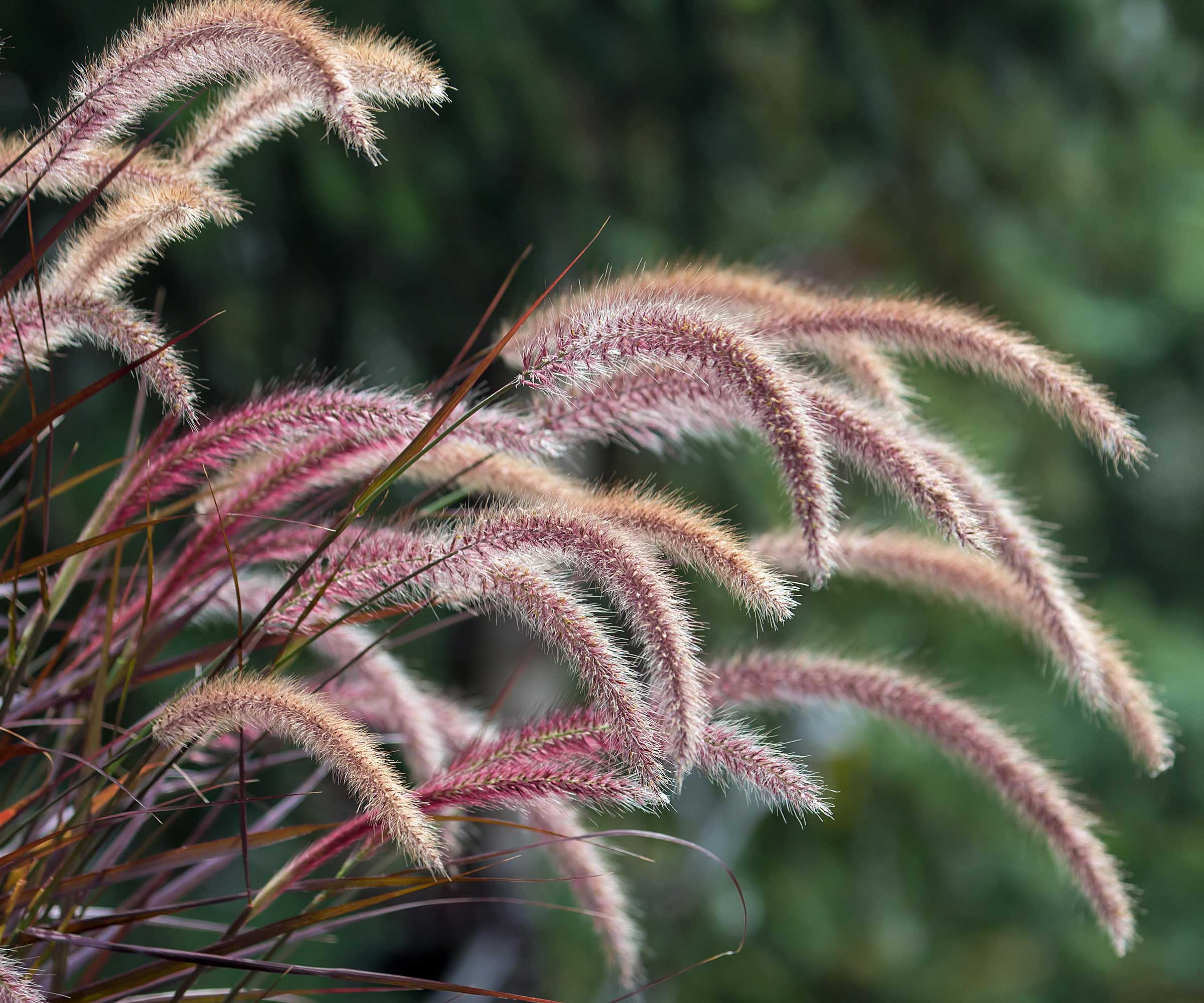
Bring movement and texture to your outdoor space
Ornamental grasses add architectural interest to an outdoor space, and can also provide garden privacy. For a pop of deep purple glamor, this variety – also known as Pennisetum setaceum 'Rubrum' – is perfect.
Megan highlights its burgundy blades and rose-red plumes. 'This dramatic grass adds movement and color to landscapes, and this cultivar does not reseed,' she adds.
It's a perennial in zones 9-11 (best pruned in early spring), but if you live in a cooler climate, you could always grow it as an annual in a large planter. Low-maintenance and drought-tolerant, this plant thrives in full sun and can grow to heights of 4ft.
5. 'Dakota™ Burgundy' beardtongue
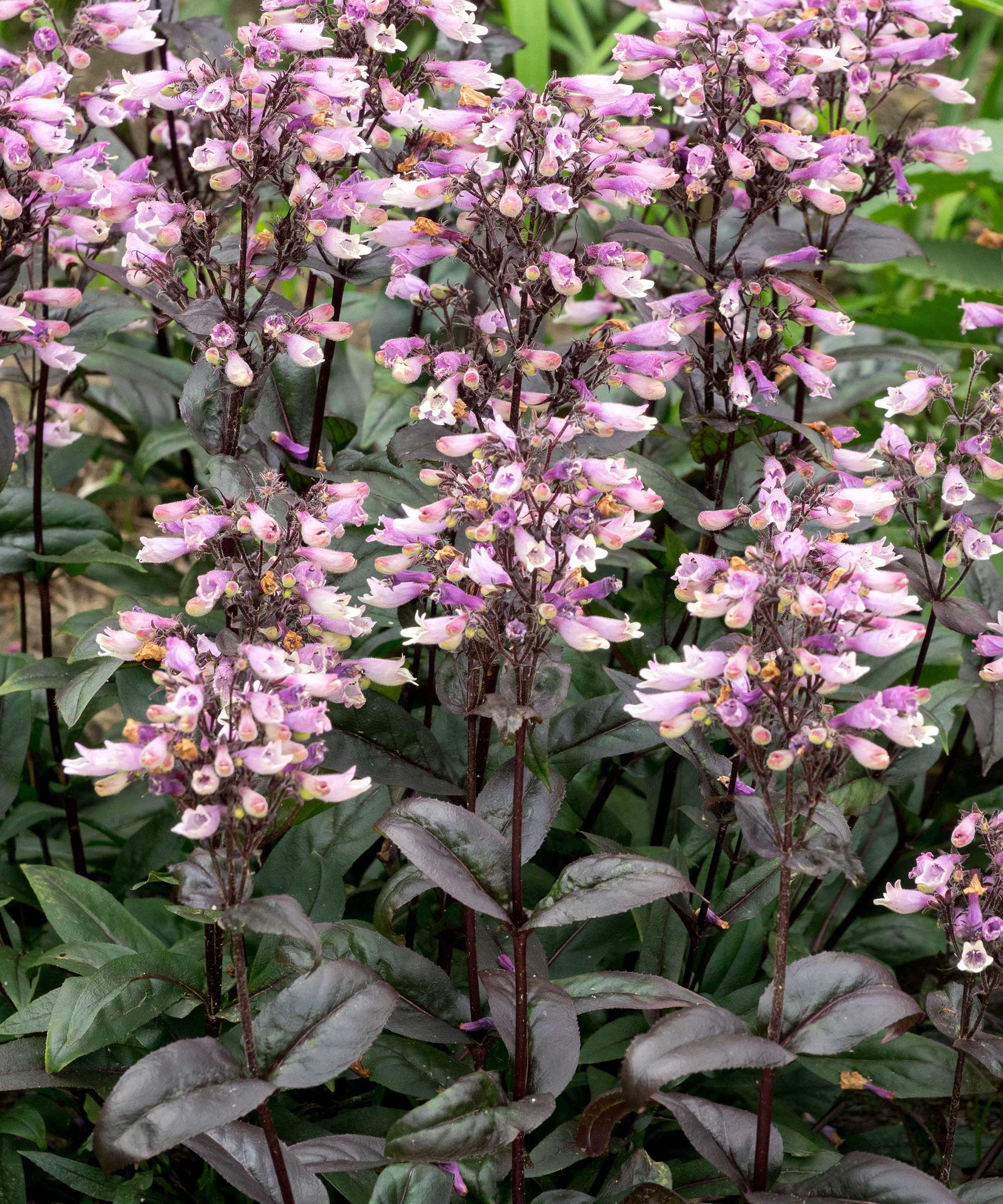
This compact plant provides a striking combination of dark foliage and vibrant blooms
'"Dakota™ Burgundy" beardtongue offers glossy, purple-black foliage that provides gorgeous contrast with its delicate lavender flowers,' says Megan. It is also compact, and tolerant to heat and humidity, she adds, noting how it's recommended for zones 3-8. 'This perennial is perfect for mixed beds, borders, meadows and naturalized gardens.'
Also known as penstemons, beardtongues are great flowers for attracting hummingbirds. Grow these beauties in full sun, and divide the plants every couple of years or so to keep them healthy and growing well.
FAQs
What are the best burgundy plants for shade?
If you're looking for burgundy plants for shade, consider darker varieties of heucheras, such as 'Primo® Black Pearl' (available from Nature Hills). For early-season color, try 'Wedding Party® Dark and Handsome' hellebores, available from Burpee. Astilbes are also a good pick for shade – try 'Dark Side of the Moon' (also from Nature Hills) which has dark foliage and purple flower spikes.
What are some top picks for burgundy annual flowers?
'Black Cat' petunias (available from Burpee) are exceptionally dark and make contemporary plants for hanging baskets. For beautiful cut blooms, try 'Chocolate Cherry' sunflowers, also from Burpee.
Looking for more color palette ideas for your outdoor space? Our guides on purple plants and trees with red leaves have plenty of inspiration.
Sign up to the Homes & Gardens newsletter
Design expertise in your inbox – from inspiring decorating ideas and beautiful celebrity homes to practical gardening advice and shopping round-ups.

Holly started writing about gardening five years ago, and she is a regular contributor to Homes & Gardens. She has also written many gardening features for Woman & Home and Real Homes, too. She has previous experience as a professional gardener, where she helped to plant and maintain private gardens. Holly has also looked after allotment plots over the years and loves to grow her own flowers and veggies from seed. In her spare time, she enjoys visiting local gardens, botanical drawing, and tending to her ever-growing collection of houseplants.
-
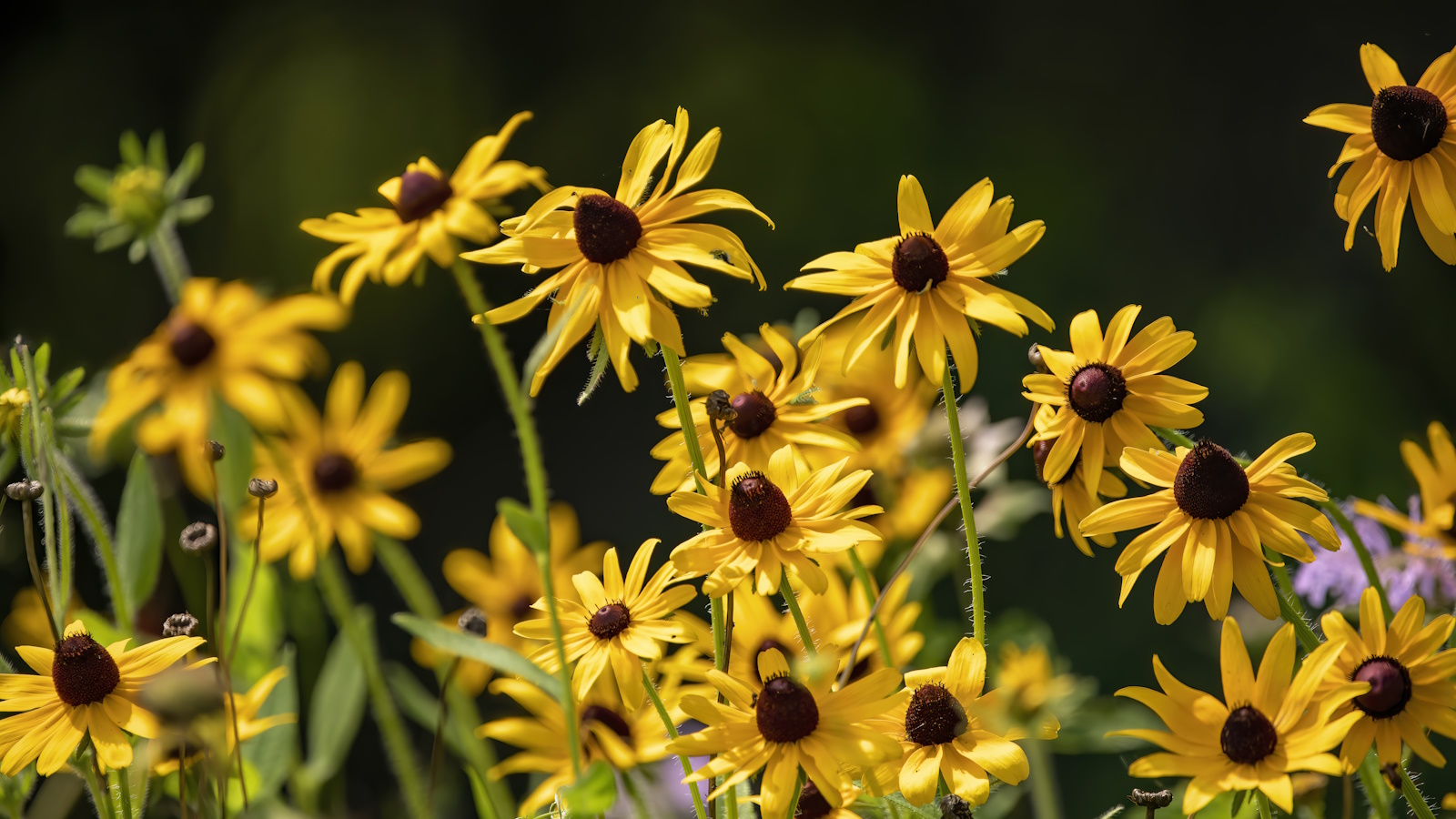 10 of the best plants for clay soil – experts recommend the flowers, shrubs and trees that can thrive in challenging conditions
10 of the best plants for clay soil – experts recommend the flowers, shrubs and trees that can thrive in challenging conditionsDiscover what varieties to grow if you want the best plants for clay soil
By Sarah Wilson
-
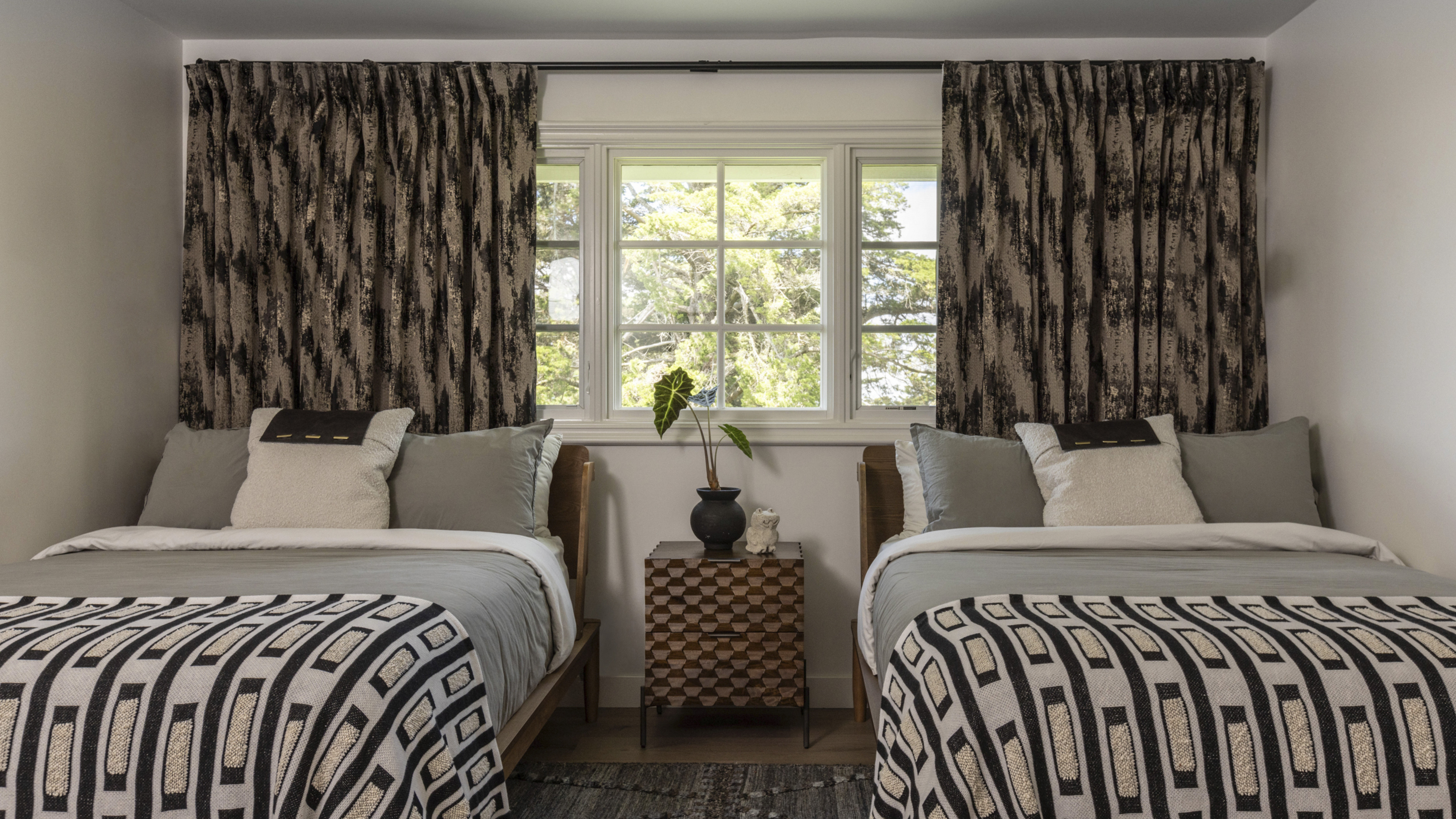 The biggest curtain trends to follow in 2025 – 8 key looks to shop that will instantly elevate your rooms
The biggest curtain trends to follow in 2025 – 8 key looks to shop that will instantly elevate your roomsThese are the colors, styles, and materials to embrace in your windows this year if you want desirable drapes, plus our favorite places to shop the trends
By Lilith Hudson